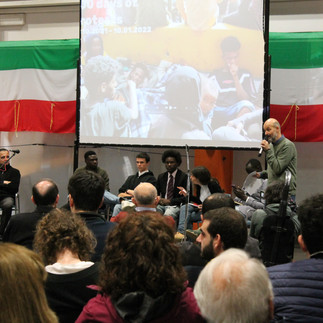From Nonantola to Tripoli: Reflections on Brotherhood, Rights, and Resistance
- Refugees in Libya

- Apr 27, 2025
- 2 min read

As always, Nonantola has proved to be a very welcoming place, even after many years. To demonstrate their closeness to our association, over 250 people attended our meeting. It was emotional to see such a large participation in a place so important to us, and it was special to see many people interested in the ideals for which we have been fighting tirelessly for years.
There were various speakers at our event, including David Yambio, one of our founders who feels at home here, having lived in Nonantola for over two years. Also present were Mahamat Daoud and Lam Magok, some of the founders and most active activists of our association.

“Am I perhaps responsible for my brother?” This question referred to the main topic of the evening. One of the strongest sentiments that emerged was the community’s willingness to open a humanitarian corridor from Libya with the goal of saving human lives from the concentration camps.
Among the topics addressed during the evening were our association, its history, and the stories of our activists. Accompanying us throughout the event was the precious presence of Bishop Erio Castellucci, a prominent figure in the Modena community, who helped us reflect on the real feasibility of a potential humanitarian corridor.

Additionally, we discussed the complicit relationships between the Italian and Libyan governments, the Libyan coast guard, pushbacks, and the current situation in Libya and Tunisia. We expressed our deepest indignation towards the mistreatment that our brothers and sisters suffer every day, in the face of the indifference of the powerful, who, despite being able to help us in our cause, choose not to react to the massacre involving over one million people still incarcerated in the concentration camps.
A reflection that emerged during the event concerned the behavior of compassion shown by those who host us: is it perhaps a mistaken thought? Is it more correct to think that these people are, in fact, our brothers and sisters, people with real rights and not just “in the imagination of people”? It is fundamental for us that those who arrive through a humanitarian corridor feel fully welcomed and are considered human, just like everyone else.
As already mentioned, those who listened to us contributed actively because “the evening did not want to be a simple conference but an active dialogue between the speakers and our audience.” Those who listened to us shared their opinions, saying that “it was a formative experience that increased our awareness of the global situation and made us reflect on the horrors that human beings have to face in their daily lives.”
Wish to Donated to support our work? Click here






























Comments